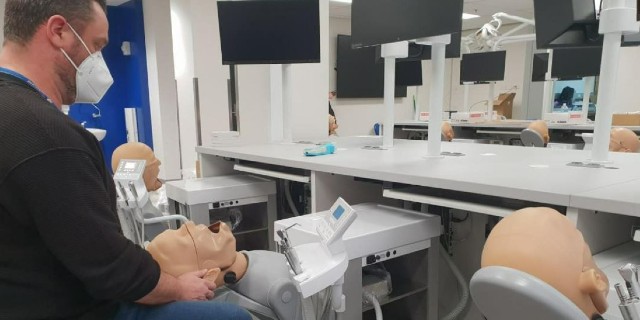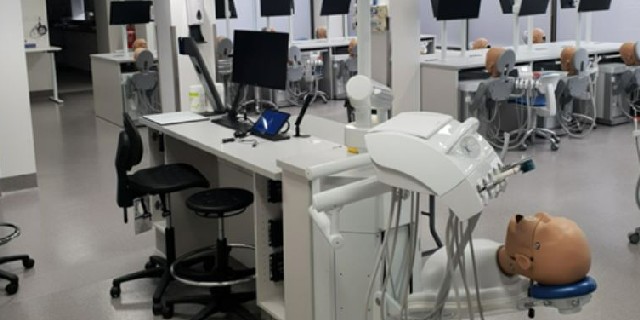Researching a Legacy
The Brian (BDSc 1949) and Ann Dooley bequest enhances teaching and learning facilities and supports students and early-career researchers. Here, we showcase how the generous bequest is having real impacts.
Dr Leanne Teoh (BPharm 2002, BDSc 2008, PhD MDHS 2021) is the 2022 recipient. She has pioneered research on dental antibiotic stewardship in Australia and is a registered dentist and pharmacist. She’s also a lecturer in dental therapeutics and an early career research fellow at Melbourne Dental School.
Antibiotics prescribed by dentists account for a significant 10 per cent of all antibiotics prescribed worldwide, but up to 80 per cent of those antibiotics are prescribed inappropriately. In a world where antimicrobial resistance is a rising threat, Dr Leanne Teoh’s research is discovering new ways to reduce unnecessary antibiotic prescribing.
As part of her PhD research, Dr Teoh has developed a digital clinical decision tool, called Drugs4dent®, that provides dentists with dentally relevant drug knowledge and supports appropriate prescribing practices.
“There are a lack of resources and tools for dentists to use chairside to assist with prescribing, and while there are many drug resources available, they are not specific for dentistry. They lack the details about drugs that dentists need to know,” says Dr Teoh.
In a pilot study, Drugs4dent® and targeted education produced a 45 per cent reduction in inappropriate dental antibiotic prescribing. The clinical decision tool, designed to be used at point of care, is in development and the Brian and Ann Dooley bequest enables Dr Teoh to continue that process and apply for grants to progress the tool further.
Dr Teoh has also been successful in securing a Dean’s Innovation Grant and the Manchester-Melbourne-Toronto Research Fund grant from the University of Melbourne.
“My research interest was born years ago while working as a pharmacist and dispensing dental prescriptions. I noticed a real gap in the provision and dissemination of medication knowledge and therapeutics in dentistry. My research has been about bridging that gap between drug knowledge and dental clinical practice,” says Dr Teoh.
Dr Teoh is a founding member of the Global Antimicrobial Resistance Dental Network for the FDI World Dental Federation and she believes dentists have an important role to play in tackling the threat of antibiotic resistance. She also champions equitable access to dental treatment.
“Access to dental treatment is crucial to tackling antibiotic resistance. When people have access to dental treatment, they are able to have their cavities and gum disease treated. When there’s less tooth decay and gum disease, there’s a reduced chance of dental infections and less need to use antibiotics,” she says.
Dr Ankur Singh is a senior lecturer in epidemiology at the Melbourne School of Population and Global Health and a senior research fellow in oral epidemiology at Melbourne Dental School. His research examines social inequalities in oral health and how to model effective policy interventions to reduce inequalities. He was the 2021 Brian and Ann Dooley PhD Scholarship recipient. He has also recently been awarded the prestigious Australian Research Council DECRA fellowship for three years and will address social inequities in oral health among working age Australian adults.
Oral health inequalities can have some unexpected impacts on health and development. In a research collaboration using data from a university in Cambodia, Dr Singh analysed whether dental caries had an impact on stunting and wasting during early childhood.
“If you’ve got dental pain due to poor teeth, you can’t eat properly and we found that when you have advanced dental caries, that leads to wasting in children,” he says.
Dr Singh has also been invited to be part of a project that will establish a global oral health program. Funded by the National Institute for Health Research in the UK, Dr Singh has been recognised for his work on simulating modelling for oral health interventions to reduce inequalities in oral health.
“A big component of the research project is to simulate whether population level interventions can reduce social inequalities in oral health outcomes. For example, we know fluoride works in reducing poor oral health at population level – if fluoride were implemented, we would see lower levels of dental caries,” Dr Singh explains.
“My modelling work simulates into the future – if we implement fluoride today, it can work out that dental caries will go down by a certain level in 10 years’ time and 20 years’ time. The aim is to project what the future effect of interventions now would be in terms of inequalities in oral health outcomes.”
Without the support of the Dooley bequest, Dr Singh says his research and involvement with Melbourne Dental School would not have been possible.
“The bequest gave me the opportunity to think about my passion. It offered me an opportunity to plan and apply for an Australian Research Council DECRA fellowship to work on addressing social inequalities in oral health,” he says.
“It was at a time when I suffered with personal loss and the support of the bequest and having confidence that my work was being supported was critical in providing me with a platform to continue my research and work. It allowed me to build this work that will bear fruit in the near future.”
Hossam El-Haddad is the Academic Lead for the Continued Professional Development (CPD) Program at Melbourne Dental School. The Program has received a major boost with a new $1.5 million laboratory that has been funded by the Dooley bequest.
The laboratory, which offered its first CPD courses in June 2022, is a significant advancement for Melbourne Dental School. It is a leading-edge, 24-person capacity preclinical laboratory that provides Melbourne Dental School with a hybrid venue for teaching new and existing student cohorts.
It also offers a dedicated facility for CPD training that meets the needs of dental professionals who want to enhance and update their skills and knowledge.
“Previously we’ve shared available labs with DDS teaching and learning and that restricted when we could offer CPD courses. The new lab has allowed us to expand the CPD calendar and offer more courses,” explains Dr El-Haddad.
The new laboratory incorporates the latest equipment including new technical dental benches that each feature a fully automated mannequin head delivery system and instrumentation that gives each user the most realistic simulation experience currently possible.
“The latex heads have teeth and the head can recline back and forth, as if a patient is lying in a chair. It helps students visualise what will happen in real life,” says Dr El-Haddad.
A demonstrator bench is also part of the new laboratory and is fitted out with high-end AV/IT connectivity and capabilities.
“We have 8K video cameras so the demonstrator’s work can be fed to each screen in each working bench and there are 60-inch screens on the walls. Cameras are able to zoom in to show close-ups and fine details during each demonstration,” says Dr El-Haddad.
The new laboratory will mean more CPD training is available in 2023 and the feedback from students and those using the facility so far has been resoundingly positive.
“People describe the laboratory as cutting-edge and effective with the best equipment – but none of that would have been possible without the very generous gift from the Brian and Ann Dooley bequest.
Without the bequest, the lab simply wouldn’t have happened,
Melbourne Dental School provides CPD courses from world-leading experts and can assist you with improving your current skills and knowledge or developing new techniques.
View the CPD program.

